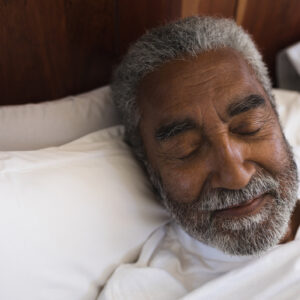How to Deal With Age-Related Sleep Problems
March 3, 2023 | Mental Health, Senior living

How’d you sleep last night? It’s an innocent question, but, unfortunately, it’s also a sore subject for some older adults. While the lack of quality sleep plagues people of all ages, natural changes in our bodies and other factors affect sleep as we age. The month of March, with the change from standard time to daylight saving time, can make things even worse for our body clocks and overall well-being.
Any crankiness or sluggishness caused by poor sleep is just the tip of the iceberg. For older adults, sleep problems have been linked to an increased risk of death. And, according to the Population Reference Bureau, “A growing body of research indicates that not getting enough sleep may also increase the risk of several conditions and chronic diseases including diabetes, cardiovascular disease, obesity, and depression.”
It’s important to practice good sleep hygiene throughout the year. Here’s a look at how aging affects our sleep, and some things you can do about it.
How aging affects our sleep
We can see the effects of aging when we look in the mirror, but things are changing inside as well. The cells that control our circadian rhythms are a good example. According to the Sleep Foundation, “These circadian rhythms influence when people get hungry, when the body releases certain hormones, and when a person feels sleepy or alert.” As the cells age, explains the Foundation, their deterioration “can disrupt circadian rhythms, directly influencing when people feel tired and alert.” Likewise, our bodies produce lower amounts of hormones such as melatonin, which also helps us sleep.
Other factors that can affect our length and quality of sleep include health conditions (such as those that cause pain), medication side effects, depression or anxiety, and daytime napping. (Of course, everyone’s sleep needs are different, so some older adults may find daytime napping to be an important part of their well-being.)
Tips for getting a good night’s sleep
Whatever sleep challenges you face, it’s important to find the nightly bedtime ritual that works best for you and stick with it. Here are a few tips from the National Library of Medicine.
- A light bedtime snack may be helpful. Many people find that warm milk increases sleepiness, because it contains a natural, sedative-like amino acid.
- Avoid stimulants such as caffeine (found in coffee, tea, cola drinks, and chocolate) for at least 3 or 4 hours before bed.
- Do not take naps during the day.
- Exercise at regular times each day, but not within 3 hours of your bedtime.
- Avoid too much stimulation, such as violent TV shows or computer games, before sleep. Practice relaxation techniques at bedtime.
- Do not watch television or use your computer, cell phone, or tablet in the bedroom.
- Try to go to bed at the same time every night and wake at the same time each morning.
- Use the bed only for sleep or sexual activity.
- Avoid tobacco products, especially before sleep.
If you have persistent problems with sleep—either getting enough sleep or getting quality sleep—talk to your doctor. You might have insomnia, sleep apnea, or another sleep disorder.

